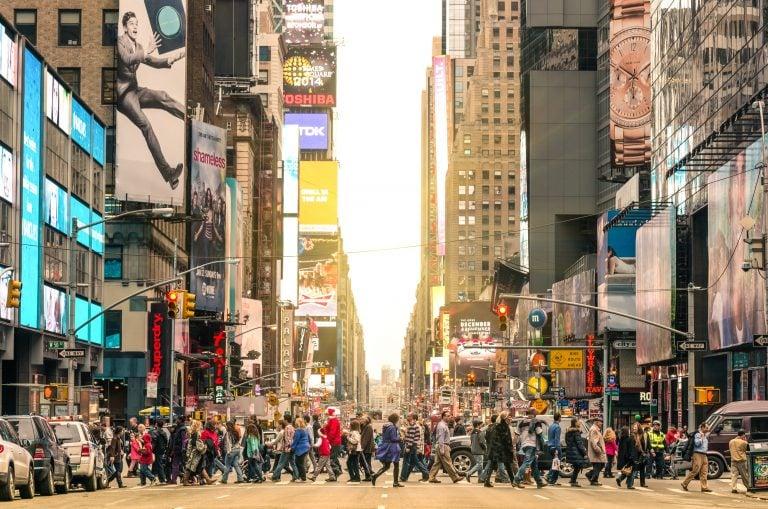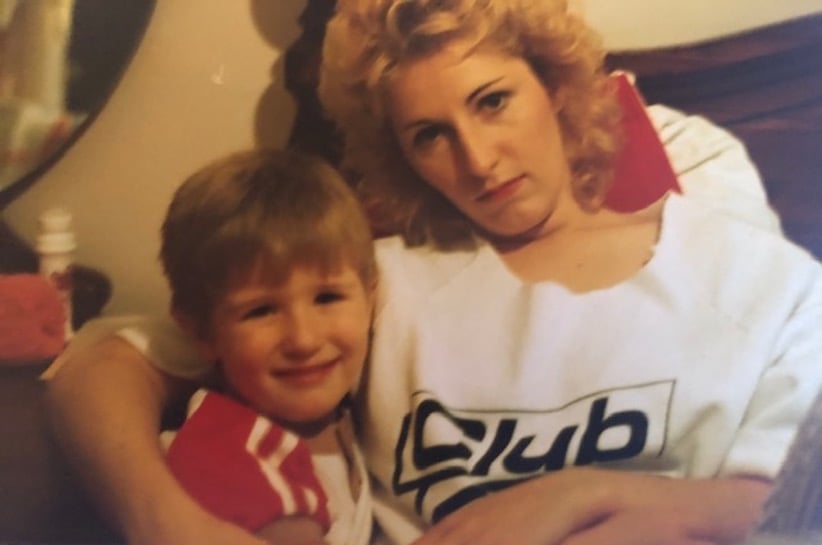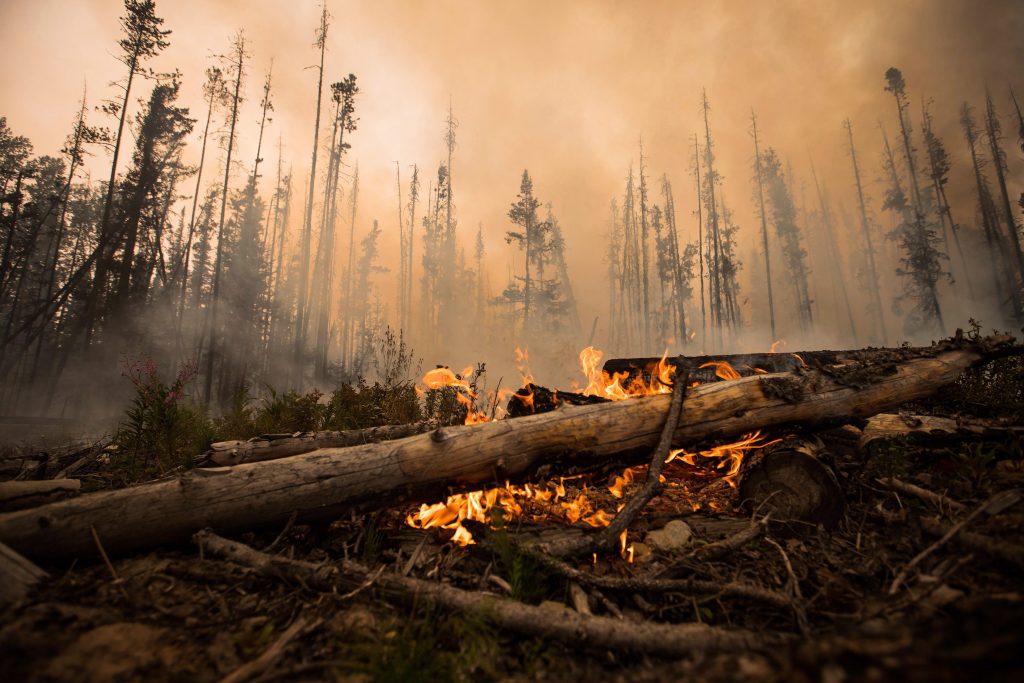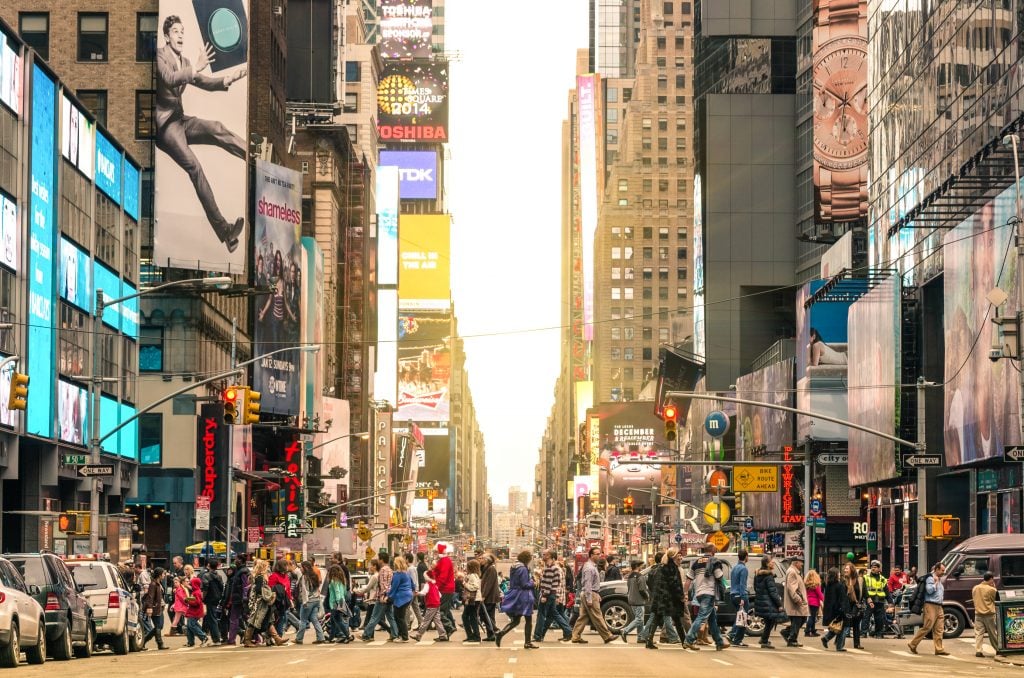If we don’t rethink the concept of progress, it could point society toward oblivion
Opinion: Understanding progress—what it is, what it isn’t, and what it’s good for—requires us to ask questions that we’re not asking right now. And the stakes are very high.

A view of a busy crosswalk in Manhattan, New York City. (Shutterstock)
Share

If I had been born just decades before I was, I would probably be dead today.
For reasons that I don’t know and never tried to find out, I entered the world with a condition that led me to an operating table at Toronto’s Hospital for Sick Children in 1989. There, I underwent a surgery to save my life, undertaken against odds I wouldn’t take on a throwaway bet for a hockey game. I was young, but I remember some of the experience: my family, coming and going; my mom, barely 23 years old, crying often; my brother, just recently born, along for the ride; my father, drunk and often absent. And then me, confused and scared. Then there were months of recovery; I remember my kindergarten classmates rushing to greet me when I returned to school.
Nearly three decades later, here I am at my computer, the wind blowing through my patio door and hot coffee beside me, and even if I were to drop dead on my keyboard this very moment, I would have lived much longer than nature had intended. That’s all thanks to the grace of progress: innovations and discoveries in the field of science and medicine put to work by doctors and nurses and pharmacists and others who improve and save and extend lives.
That’s my story. But we can find similar tales throughout the world. We can weave our way through a warren of interconnected achievements that have made billions of us healthier and wealthier, safer and more comfortable than we have ever been. New treatments, procedures, and drugs mean longer and more comfortable lives. Because of these advancements, an infected tooth abscess or appendicitis or pneumonia or influenza or even something more complicated such as a defective organ no longer implies a likely death.
“In 1900, the top 3 causes of death were infectious diseases—pneumonia and flu, tuberculosis, and gastrointestinal infections,” writes Rebecca Tippett, director of Carolina Demography at the University of Carolina at Chapel Hill. Life expectancy for a newborn was 47.3 years in 1900; in 2010, she notes, it was 78.7. Today, the top causes of death are chronic diseases often linked to lifestyle.
We’re living longer, making heart disease and cancer more likely culprits of our demise. Data from Statistics Canada tracing trends in mortality from 1950 to 2012 helps explain some other reasons that more of us are making it to our eighth and ninth decade: deaths from injury—intentional or accidental, including suicide and homicide—are in decline, thanks in part to the invention and mandatory use of the seatbelt and efforts to tackle drinking and driving.
But just comparing these stats—seeing progress in the simple, binary act of measurements—doesn’t quite tell the whole story.
Our progress narrative is incomplete. What’s missing are the moral questions that should be appended to any discussion of progress—chiefly, what are we progressing toward? If progress is about more, which it usually is, then we can ask: “More what?” Usually, the answer is more life, more food, more health, more stuff—but more, to what point? To what end?
Those two questions are where the conversation about progress should begin.

Our leaps forward have brought about a bunch of good things that we have more of, but plenty of attendant bad things we have more of, too—forest fires, floods, droughts. In August, British Columbia declared a state of emergency as wildfires raged throughout the province, its second such emergency in the last two years. In Vancouver, the local section of the Pacific Ranges vanished into an orange-yellow pallor that washed the sky, the smoke blocking the sun and lowering temperatures. Further north, the town of Prince George disappeared into black, the day as dark as night. In these places, we have more progress—and also more devastation.
It’s with climate change that we encounter, perhaps more than in any other issue, the ambiguous nature of how we understand progress. For instance, the Industrial Revolution was a leap forward that improved innumerable lives, but it simultaneously made innumerable lives of those who served it miserable; it was also a big step on the road to climate change. The rise of mass industry and production also represented the rise of the mass burning of fossil fuels, the lead cause of anthropogenic climate change. Even the origins of human agriculture are complicated; the Sumerians, farming their fields around 2000 BCE, represented a marked leap in those techniques, but intensive farming led to what historian Susan Wise Bauer calls “the first environmental disaster,” and some historians, including Bauer in her monumental work The History of the Ancient World, argue that disaster helped bring about the Sumerian civilization’s collapse.
Climate change is an existential threat, the greatest ever faced by humanity. Its effects, unchecked, will upend our way of life. It will kill many millions of us, and it could also undermine democracy or even lead to its collapse. Pollution alone, according to the World Health Organization, already kills 7 million people a year, with 90 per cent of us exposed to “dangerously high levels of pollutants that can lead to cancer and cardiovascular diseases.” And now, according to a landmark report from the United Nations’ Intergovernmental Panel on Climate Change, restraining global warming to no more than 1.5˚C—the lower end of the vow from the signatories to the Paris accord—will still require major and immediate transformation, or we risk a high chance of a dire humanitarian crisis as soon as 2040.
READ MORE: Climate change is making weather more extreme. Here’s how Canada can prepare
So what if, instead of adopting progress as an inherently desirable and good thing, we started to figure out what we want and worked backward? Essentially: what if we made progress the servant of a moral goal, rather than a technological challenge or organizational puzzle?
If we do this, we might conclude that we want billions of people to be able to live with comfort and dignity on this planet for hundreds and hundreds of years to come, to co-exist peacefully, and to love their family and friends. As obvious as that conclusion might seem, pursuing it would require a paradigm shift that places “Why should we?” in front of “How can we?”—and that requires us to ask whether and why we should do something, instead of merely whether we can do it. It also requires us to socialize progress as a fundamental human good that ought to be shared, equitably if not equally, by everyone in this generation as well as the next and the next, on down the line. All of this means we must look much farther into the future than we do today.
READ MORE: Why governmental climate leadership should be seen as a matter of morality
Ronald Wright, who delivered the 2004 Massey Lecture “A Short History of Progress”, has been thinking about history and progress for decades, and when he spoke to me in 2017, he pointed out that our political and economic cycles are short. The former means that politicians are always concerned with getting elected. The latter means that humans who make up the free market are always concerned with immediate growth. “Our institutions and the frameworks in which our political and economic system works are predicated on very short-term thinking—and they are very good at dealing with short-term, immediate problems,” he said. “They are quite incapable of dealing, so it seems, with long-term problems.”
That tendency to focus on the short term, the immediate, poses an existential threat. “When I was writing the Massey Lectures, I would say, on balance, I thought we had a 50-50 chance of getting ourselves out of the hole into which we had dug ourselves,” says Wright. “Now I think the chances are less than 50. Probably something like 40 to 60 per cent against.” It’s hard to like those odds.
Indeed, the problem with our conception of progress is that we are viewing the phenomenon in a particular place and time—a high-definition snapshot of life today against a grainy image from the past, which captures every detail but hides so much of the story. The progress narrative belies the threats to upend the genuine advances we have made, the proceeds of which we have failed to adequately distribute and the excesses of which we have failed to prevent or curb—and could cost us the whole damned thing.
We fall into this trap of cognitive dissonance: a state in which our thoughts or beliefs are in tension with one another, in which we must confront some paradox or contradiction or absurdity. Between generations, the dissonance grows as each group resets the counter, but now ratcheted up a few ticks. Each generation accepts a new normal. But what if each new normal presses us ever closer to destruction?

The Anthropocene era is our geological age or epoch, defined, as the immersive contemporary art exhibit of the same name puts it, “by the permanent impact of human activities on Earth, such as terraforming through mining, urbanization and agriculture; human-caused extinction and biodiversity loss; and the global presence of materials such as plastics and concrete.” And so while our era has been defined by progress in the way we think about the concept now, it’s not so obvious that we can say the same thing if we take the long view—one in which the new normal of our own existence isn’t part of the cognitive bias.
MACLEAN’S LIVE: Watch a stream of Paul Wells interviewing Anthropocene artist Edward Burtynsky
To think of progress as a mere reflection of our capacity to produce things or states that we think are useful, beautiful, or good is to substitute the means for the ends, which seems to be the defining mode of the Anthropocene era. But to understand progress, we must contend with the challenge that could come with any change, because most developments are subject to hijacking or exploitation or unintended consequences—or, as the French philosopher Michel Foucault might put it, rather than saying that progress is good or bad, we might say that progress is potentially dangerous. Indeed, the old conservative defence of tradition, from the time of Edmund Burke, is that institutions serve a purpose for which they have adapted over time. (You never tear down a fence, they say, until you know why it was put up.) Since human wisdom is limited, too much progress happening too quickly risks the radical undoing of old ways, and the destruction, chaos, and even regression that could accompany it.
Tackling climate change isn’t the lone issue affected by a cloudy lens that prevents us from seeing the whole picture. Take nuclear technology as another example: it powers countries and saves lives when used in medicine, but it risks bringing destruction and disorder when it’s weaponized and proliferated. In this century, the world is more dangerous and less stable because of nuclear weapons programs adopted by Iran and North Korea, and it is hard to imagine these will be the last two countries to pursue such catastrophic tools of death. But nuclear weapons are big and inherently frightening and far away, socked away in mountains or underground or in the ocean on submarines, so the next generation may become more comfortable with nuclear proliferation, the way many got used to the existential threat of the Cold War—all creating more dissonance. But familiarity with the threat of potential mass destruction doesn’t make the world any less dangerous.
Cities, however, are closer to many of us; 90 per cent of Canadians now live in them. These big collections of settled life are familiar, and common, and growing, and taken for granted as good. But they too carry a fundamental ambiguity or tension. In Against the Grain, political scientist and anthropologist James C. Scott argues that city life, which ended foraging and herding for many, also introduced diseases—indeed, epidemics. In fact, he suggests that sedentary life in cities and the accumulation of grain contributed to a “tax-grain-surplus” regime that empowered a ruling class and allowed them to exploit, even enslave, a working class. Looking at growing inequality against a backdrop of plenty and growing rates of obesity and preventable disease alongside common awareness of how and why we’re getting sick, we can see ways that we are progressing ourselves apart—and to death.
What if we looked at other contemporary social, political, economic, or technological structures—from liberal democracy to globalization to capitalism—to seek out and better understand the complex tension and ambiguity within them? For all the good that has accompanied each of these, so too has an entrenchment of a wealthy, ruling elite. Globalization itself has contributed to the global exploitation of hundreds of millions of people—tens of millions who are trapped in modern slavery, including many in developed democracies—and has raised the spectre of the next pandemic possibly making the 1918 outbreak of the Spanish Flu, which infected 500 million people and killed as many as 50 million of them, seem moderate. Indeed, in the spring of 2018, researchers at the Johns Hopkins Centre for Health Security ran the Clade X pandemic simulation, gaming out the “outbreak of a moderately contagious and moderately lethal novel pathogen”; within a year, in their scenario, 150 million people were dead worldwide. And then, as ever, there’s climate change, which could prove to be a final stop for the way of life we now cite as the product of centuries, if not millennia, of clear, delineated progress as it ushers in weather disasters, refugee crises, food shortages, even war.
READ MORE: Are ‘green’ cities a big part of our problem with climate change?
To understand who we are as a species, what we have done, and whether on balance we ought to be celebrating our “progress,” we must take a clear-eyed look back as well as forward. There’s no doubt that we have made advancements for many in life expectancy, quality of life, gadgetry, and human rights, but we have also destroyed ways of living, marginalized and exploited millions of people, and entered into a series of progress traps that threaten to undo much of the good we’ve managed while further locking in the bad as the newer and newer normal. Without deep ethical and moral progress, it looks increasingly likely that little of what we have managed to develop is likely to outlast the next few generations. Progress, then, depends on a structural transformation of our social, political, and economic structures in ways that will make them radically more diverse, inclusive, equal, just, and sustainable. Without that change, we’ll be left singing the praises of progress while we race blindly toward our own destruction.
And if we get there—if we reach that end, without having looked back—who will be left to tell the story of all the progress we made while we were around?